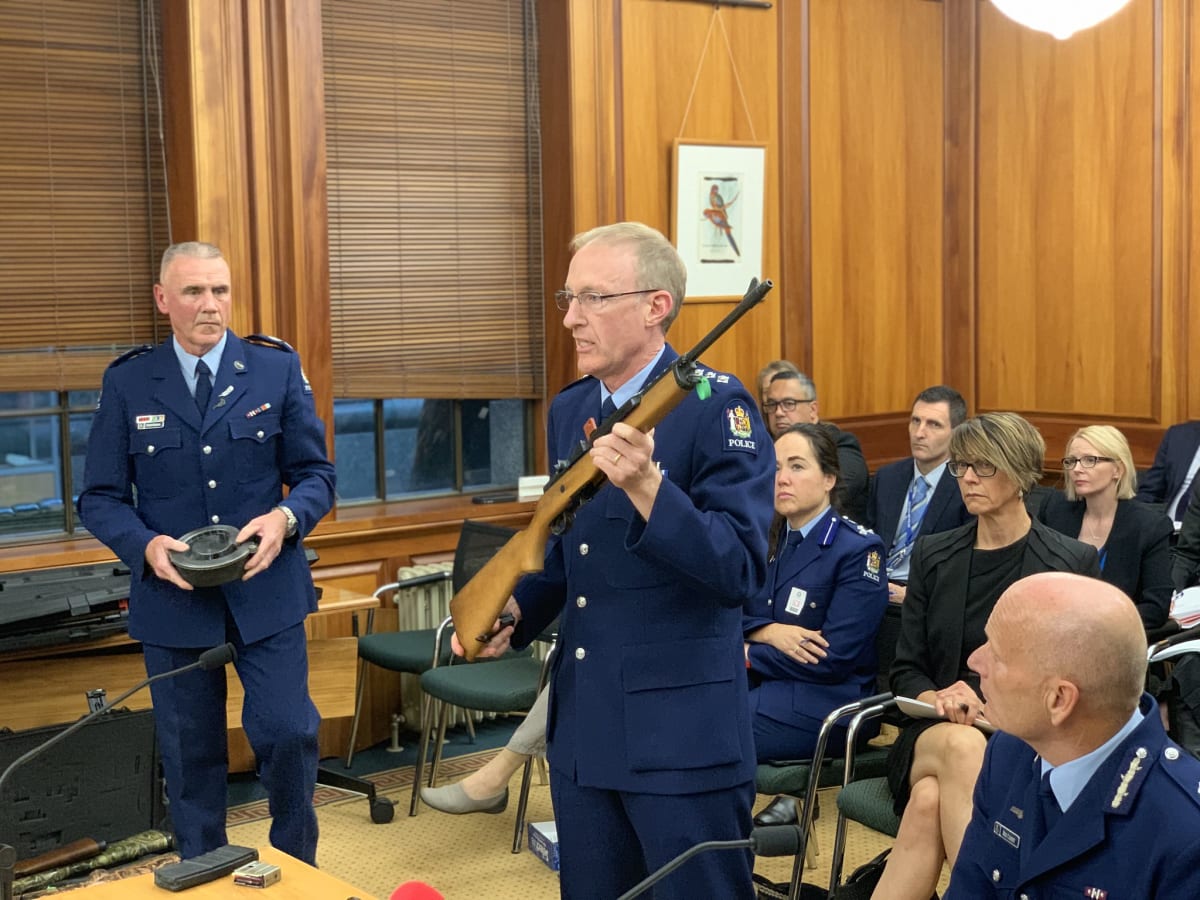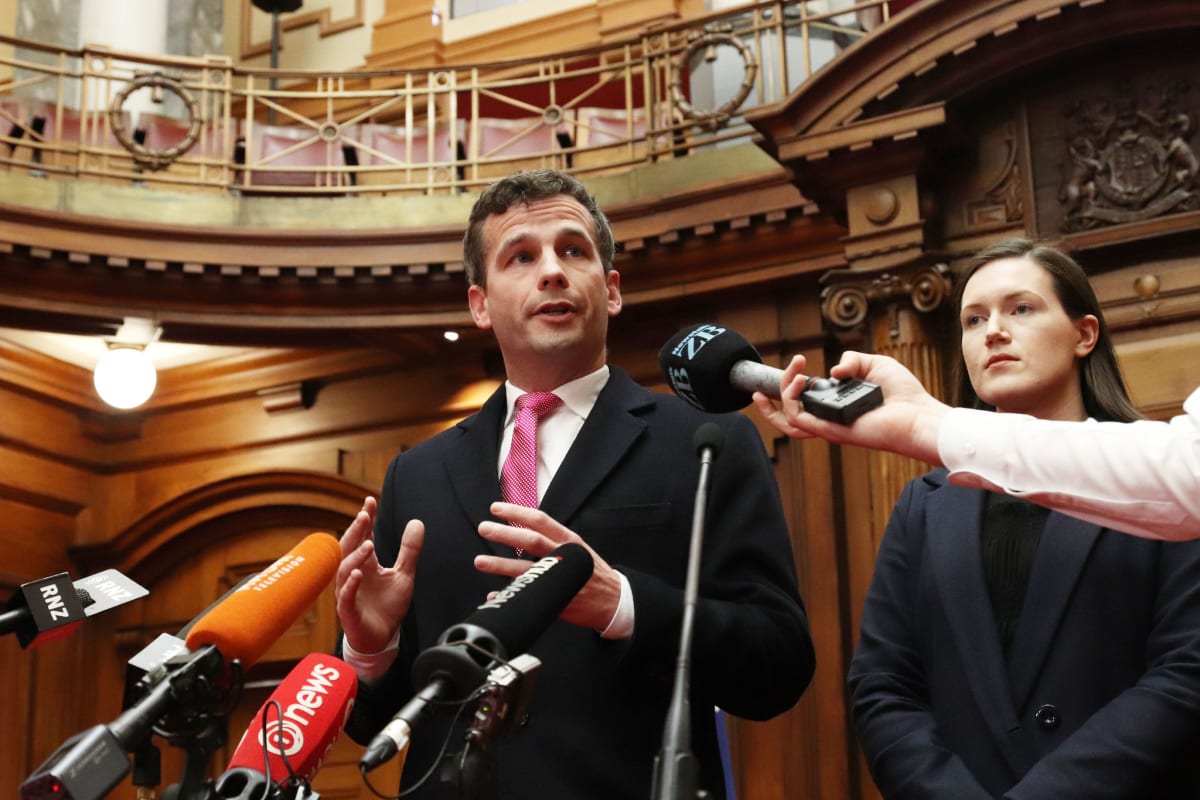The winds changed for ACT when David Seymour stood as the sole MP against legislation to outlaw military-style semi-automatic weapons in the wake of the 2019 Christchurch mosque attack.
Seymour had been putting in the hard graft on his End of Life Choice Bill, looking after his Epsom electorate, and lifting his profile through reality TV. But ACT’s change of fortune began when it sided with New Zealand’s large, and often-forgotten, firearms community to decry the ban on the type of gun used by the Christchurch killer.
This new party position seemed at odds with the message from former ACT party leader John Banks, who said his biggest regret in politics was his inability to push through tighter gun laws following the Aramoana massacre. And firearms aren’t very Epsom.
But Seymour has maintained he was never courting votes from gun enthusiasts – especially not those talking about hiding their weapons or throwing them off the back of boats to avoid the police buy-back scheme. Instead, his opposition to the first tranche of changes was about the legislative process (or lack thereof). It was rushed legislation, which wouldn’t have the desired effect, he said.
Regardless, gun owners from all backgrounds flocked to ACT.
The community felt let down by New Zealand First. Once the party of law-abiding firearms owners, Winston Peters said the world had changed and so had the minds of New Zealand First MPs.
“You can’t have 51 people lose their lives and 49 almost dead or damaged for the rest of their time on this earth without you doing something.”
In a recent campaign speech, Peters said this might have cost his party much-needed votes, but he stood by his shift in position.
“We are from the countryside, we have lived on farms, we have used guns, we know that pest control is massive and it is literally a matter of survival in some cases. We understand all that, but we were never going to be the puppets of the NRA from the USA.
“You can’t have 51 people lose their lives and 49 almost dead or damaged for the rest of their time on this earth without you doing something.”
New Zealand First, as well as New Conservatives, continue to court the gun vote (Ron Mark even went so far as to tell a Masterton audience his party didn’t agree with some of the law changes it recently signed off). But the support of the community looks set to go to ACT – a party that’s now polling consistently between 7 and 8 percent.
Given how much the party owes to its firearms family, it was no surprise to see Nicole McKee on the party’s list of candidates for this year’s election.
What might have been surprising, was how much ACT has leaned into the gun vote.
A June press release from ACT president Tim Jago, pointed out not once, but twice, that the party’s 2020 list included seven licensed firearms owners.
And at number three in the list, McKee is now a sure thing.
Over the past year, McKee has become synonymous with the pro-gun lobby. The prominent advocate also runs her own firearms safety training business and is a New Zealand shooting champion.
She is a mother of four and until recently, was the spokesperson for the Council of Licenced Firearms Owners (COLFO).

McKee graced the country’s TV screens almost nightly in the wake of the Christchurch attack. As the Government ushered through two rounds of gun law changes she became the calm and consistent voice of the opposition to the proposed firearms reform.
This approach keeps with a recent international shift in the way pro-gun groups do public relations. Well-designed communications issues management strategies, which rely on research and reason, have taken over from the old ideological arguments.
A similar shift has taken place in the United States over the past decade, with the NRA’s rhetoric and communications strategies also evolving.
No longer are easy-to-discount, angry men the face of the firearms community. Instead, it’s people like Australia’s Samara McPhedran and Nicole McKee.
McKee has been so effective in her communication, she was named BlacklandPR’s Communicator of the Year in 2019.
Her ability to respond to questions on topics once considered fringe, such as firearms reform and now anti-1080, with composure and reason, will get McKee far in the halls of power. ACT is well-aware of the advantage of a master communicator – something the opposition often regards as Jacinda Ardern’s greatest strength.
In a recent interview, McKee was asked whether she was a one-trick pony. She said she wasn’t but she also struggled to give a clear position on the issue of Oranga Tamariki’s child uplifts, and whether the ministry’s chief executive should go, despite saying this was a policy area that concerned her.
But like any seasoned communicator, she managed to artfully defer, saying she’d need to investigate further, and then moved the conversation along. It’s this ability to control a conversation that will serve her well in politics.
In response to a set of questions, which Newsroom sent to ACT’s top 15 candidates, McKee said her reason for joining the party was the rushed firearms law, which “demonises a sector of our society in an unfair and undemocratic way”.
The coalition Government told New Zealand, and the world, the new legislation would make New Zealand safer, she said. But as a firearms safety instructor, McKee said she believed the legislation would have the opposite effect. New Zealanders would be less safe.
In line with ACT’s firearms policy, McKee is calling for a repeal of most of the second tranche of firearms reforms – the one that would change the testing regime used to decide who is able to obtain and keep a firearms licence, and set up a gun register.
“The effect will be that those people who have been properly vetted and licensed will not become the target of bad law; the law breakers will.”
After repealing the changes, ACT’s policy is to wait for the report from the Christchurch Royal Commission of Inquiry, then start work on firearms reform, rewriting and updating the Arms Act 1983 and its subsequent amendments over 37 years “via a true democratic consultative process and with the learnings obtained from the RCI”.
“The effect will be that those people who have been properly vetted and licensed will not become the target of bad law; the law breakers will.”
McKee made three main points when asked to explain how the gun laws had made Kiwis less safe.
Firstly, the changes would lump ineffective and costly compliance regimes on firearms owners, she said. There were already errors in the existing police registration regime; and a full list of names, addresses and guns was “a criminal shopping list waiting to be breached”.
The changes could lead to the closure of ranges and clubs, which would mean less peer oversight. It could also mean fewer safe places for gun owners to use their guns or sight in their rifles, leading to more illegal shooting at riverbanks and in rural backyards.
And McKee said she was concerned firearms owners, especially those who lived rurally, might not seek help or support from their GP for fear of their personal medical information or mental health record being shared with police. This concern was shared by the Privacy Commissioner.
Doctors are already allowed (but not required) to disclose patient information to police if they are concerned a person (including a firearms owner) may pose a danger to themselves or others. But the new law sets out more specific rules and processes around this ability for doctors to disclose patient information.
“The [Government] said they would make New Zealand a safer place by implementing two pieces of legislation in a hurry that would fix the country’s woes with firearms ownership. The reality is that it hasn’t and was never going to,” she said.
While McKee has become a household name in the past year, the long-time hunter and sport shooter is not new to political advocacy and lobbying, she’s long been engaged in influencing firearms law reform.
The Rongotai candidate said it was her experiences with firearms lobbying and advocacy that led to her joining the ACT Party.
After discussing what she believed was the unfair treatment of minority groups, such as hunters, farmers, and landlords, McKee said she was proud to take a stand under the party’s principles of freedom and fairness, less governance and more personal responsibility, and freedom of speech and choice.
“I have had death threats, been called names, had all of the tyres slashed on one of our cars out the front of my home.”
But McKee’s work on behalf of firearms owners has come at a cost to her family and her career.
So before she signed up to the gruelling and difficult job of national politics, she had to seek whānau approval.
McKee said she had been on the receiving end of both threats and violence since she put her head above the parapet.
When asked what she’d endured, she was willing to elaborate, but fearful her family may be targeted further.
“This topic is an emotive one for many in the country,” she said.
“I have had death threats, been called names, had all of the tyres slashed on one of our cars out the front of my home.”
This happened while her children were sleeping, just metres away. There was also gang tagging, which identified her home.
“My family have been trolled through social media, including my dear mum.”

McKee said she had also found it difficult to renew business contracts, as her advocacy had taken up so much time – the majority of which she gave as a volunteer.
“So as a small business owner, if you’re not working for your business, but volunteering elsewhere, then you don’t get the mahi done.”
ACT looks set to return to Parliament with about 10 MPs, and it owes a vote of thanks to the firearms community.
After Seymour stood in Parliament in April 2019, and opposed the banning of the type of gun used in the Christchurch shooting – “this bill is not an attempt to improve public safety; it is an exercise in political theatre” – Facebook pages of firearms special interest groups filled with support for ACT.
The party’s popularity surged in immediate response to the party’s stance of firearms, and has continued to climb in recent months.
With just a few days left until the election, firearms owners are encouraging each other to vote for ACT.
Now with a job at Parliament looming, McKee will be preparing her next steps on gun law reform. But she’ll also need to prepare herself for the range of situations and issues awaiting her. Because no aspiring politician wants to be labelled a one-trick pony.



